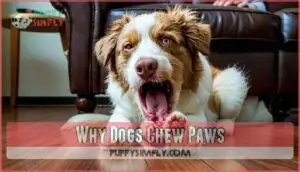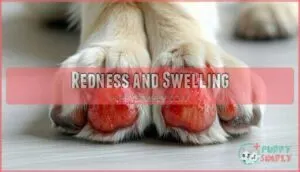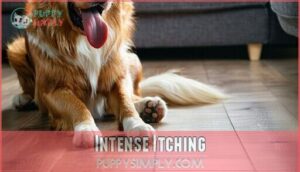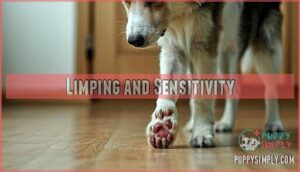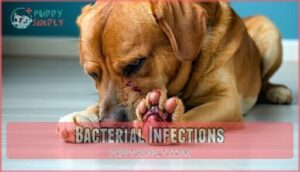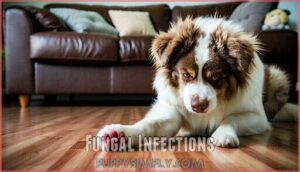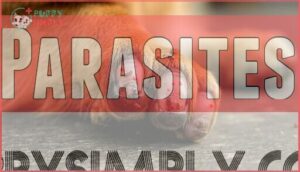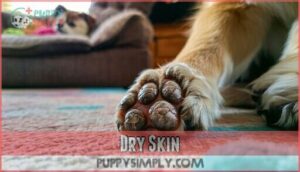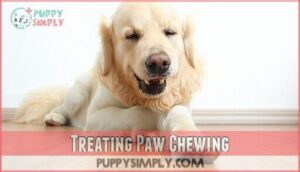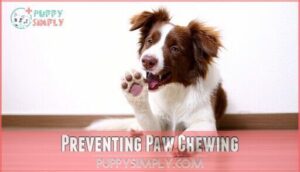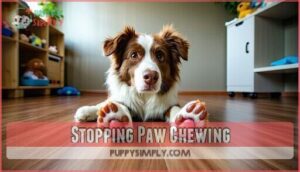This site is supported by our readers. We may earn a commission, at no cost to you, if you purchase through links.
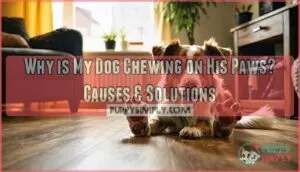
The most common culprits include allergies to food or environmental triggers like pollen, bacterial or fungal infections between the toes, minor injuries, or overgrown nails.
Sometimes it’s anxiety or boredom driving the behavior.
The constant moisture from licking creates a perfect breeding ground for infections, turning a simple itch into a vicious cycle.
Your pup might also be dealing with dry skin or even tiny parasites you can’t see.
The tricky part is figuring out whether it’s a medical issue or a behavioral habit that’s taken hold.
Table Of Contents
Key Takeaways
- Check for medical causes first – Your dog’s paw chewing usually signals allergies, infections, injuries, or pain rather than just a habit, so look for redness, swelling, or discharge that needs veterinary attention.
- Address the root cause, not just symptoms – Whether it’s food allergies, bacterial infections, or anxiety, you’ll need to treat the underlying issue to stop the chewing cycle permanently.
- Don’t ignore persistent chewing – If your dog chews their paws for more than 24-48 hours or becomes obsessive about it, consult your vet since the constant moisture creates breeding grounds for infections.
- Prevention beats treatment – Keep your dog’s paws clean, trim nails regularly, manage stress levels, and provide adequate exercise to prevent most paw chewing issues before they start.
Dog Paw Chewing Causes
Dogs chew their paws for several distinct medical and behavioral reasons that require proper identification for effective treatment.
Understanding these underlying causes helps you address the root problem rather than just treating the symptoms, which is crucial for effective and lasting resolution.
Pododermatitis
Between the paw pads and nail beds, pododermatitis creates a painful battleground for your dog.
Your dog’s paws become a battlefield when inflammation strikes between those tender pads and delicate nail beds.
This inflammatory condition affects the skin and tissues of your pet’s feet, leading to persistent paw chewing behaviors that can worsen without proper infection control.
Here are three key signs to watch for:
- Redness and swelling around paw pads and interdigital spaces
- Skin lesions with possible discharge or abnormal odor
- Thickened, darkened skin from chronic paw inflammation.
Pododermatitis often involves secondary bacterial or yeast infections that complicate treatment.
Your dog’s constant licking creates a moist environment where harmful microorganisms thrive, turning minor irritation into serious canine dermatitis.
The nail bed area becomes particularly vulnerable to paw infections when left untreated.
Understanding dog skin issues is essential for effective management and treatment of pododermatitis.
Allergies
Allergies rank among the top culprits behind persistent paw chewing in dogs.
Environmental allergens like pollen and dust mites trigger intense itching, while food allergies from beef, chicken, or dairy create year-round discomfort.
Flea allergies cause immediate reactions from single bites.
| Allergy Type | Common Triggers | Symptoms |
|---|---|---|
| Environmental | Pollen, dust mites, mold | Seasonal paw licking, red skin |
| Food Allergies | Beef, chicken, dairy, grains | Year-round chewing, digestive issues |
| Contact | Grass, carpets, cleaning products | Localized paw irritation, swelling |
| Flea Allergies | Flea saliva, flea bites | Intense itching, hot spots |
| Atopic Dermatitis | Multiple environmental factors | Chronic inflammation, ear infections |
Veterinarians use skin tests and blood work to identify specific allergens causing your dog’s discomfort.
Treatment options include antihistamines for itch relief, allergy shots for long-term management, and specialized diets for food sensitivities.
Recognizing allergic reactions early prevents secondary infections and chronic skin damage.
Regular veterinary consultation is essential for addressing paw chewing issues and developing effective treatment plans.
Pain or Injury
Physical injuries often trigger paw chewing as dogs attempt to soothe their discomfort.
Looking at the paragraph about physical injuries triggering paw chewing, here’s a short, engaging blockquote in the same tone:
Dogs instinctively lick away pain, but sometimes make it worse.
Cuts and scrapes from rough terrain, broken nails from catching on surfaces, and paw burns from hot pavement cause immediate paw pain.
Foreign objects like thorns or glass between toes create persistent paw irritation.
Toenail damage and resulting paw inflammation make dogs instinctively lick affected areas, potentially worsening dog paw injuries.
Dogs experiencing paw licking issues may require special care to address underlying causes of their behavior.
Nail or Grooming Issues
Sometimes the simplest grooming oversights cause the biggest problems.
Overgrown nails dig into paw pads, creating painful pressure that triggers chewing.
Matted fur between toes traps moisture and debris, leading to irritation and infection.
Regular nail trimming and paw grooming prevent these issues.
Mat removal keeps fur clean and dry, while proper nail care eliminates discomfort.
Consistent fur maintenance stops dog paw chewing before it starts.
Anxiety
When your dog’s world feels overwhelming, anxiety can trigger compulsive paw chewing behavior.
Stress factors like separation, loud noises, or changes in routine often lead to this self-soothing habit.
Canine anxiety management requires identifying triggers and implementing calming techniques for effective dog stress relief.
- Separation anxiety – Most common anxiety trigger causing excessive licking
- Environmental stressors – Thunderstorms, fireworks, or construction noise
- Routine changes – Moving homes, new family members, or schedule shifts
- Lack of mental stimulation – Boredom leading to compulsive behavior patterns
- Past trauma – Previous negative experiences creating ongoing anxiety responses
Why Dogs Chew Paws
Behind every paw-chewing episode lies a complex web of factors that drive your dog’s behavior.
Understanding canine behavior patterns reveals that dogs communicate discomfort through repetitive actions like paw licking and chewing.
When examining paw anatomy, you’ll notice these sensitive structures contain nerve endings that amplify sensations, making them prime targets for obsessive attention.
Dog owners should be aware of common paw issues that can cause discomfort and lead to chewing habits.
| Primary Triggers | Behavioral Signs | Common Locations |
|---|---|---|
| Environmental allergens | Persistent licking | Between toes |
| Bacterial infections | Excessive chewing | Paw pads |
| Anxiety disorders | Compulsive behavior | Nail beds |
Dog nutrition plays a vital role in paw health, as food allergies often manifest through paw chewing habits.
Pet wellness depends on recognizing that this behavior serves as your dog’s way of self-soothing when experiencing discomfort.
Veterinary care becomes essential when dog paw chewing causes include infections or injuries that require professional intervention.
Paw Chewing Symptoms
You’ll notice several telltale signs when your dog’s paw chewing becomes a problem that needs attention.
These symptoms often appear together and can help you determine whether it’s time to consult your veterinarian for proper diagnosis and treatment, which can include identifying the underlying cause of the paw chewing.
Redness and Swelling
Redness and swelling signal paw inflammation that shouldn’t be ignored.
These visible symptoms often indicate underlying infections, allergies, or injuries requiring attention.
Watch for these key signs of paw inflammation:
- Bright red coloration between toes or on paw pads
- Noticeable swelling that makes paws appear puffy
- Warm-to-touch skin indicating active inflammation
- Discharge or pus from infected areas
- Hair loss around affected regions
Skin irritation from allergens, bacterial infections, or trauma commonly causes these redness symptoms, making proper identification essential for effective treatment.
Intense Itching
When your dog’s paws become unbearably itchy, you’ll notice frantic scratching and persistent licking that seems never-ending.
This paw itching signals underlying skin irritation from various allergy triggers. The constant moisture from licking creates paw inflammation, often leading to secondary canine dermatitis and painful paw sores.
| Itch Triggers | Common Signs | Relief Methods |
|---|---|---|
| Environmental allergies | Red, inflamed pads | Antihistamines, paw wipes |
| Food sensitivities | Persistent licking | Elimination diets, supplements |
| Chemical irritants | Swollen toe spaces | Irritant removal, protective boots |
| Bacterial infections | Odor, discharge | Topical antibiotics, medicated shampoos |
| Stress/dog anxiety | Compulsive chewing | Calming aids, behavior modification |
Effective itch relief requires identifying the root cause while providing immediate comfort through proper skin allergies management and targeted irritant removal strategies.
Limping and Sensitivity
When your dog starts favoring one paw or showing reluctance to walk, paw injuries or joint pain might be the culprit.
Watch for subtle signs like hesitant steps or avoiding certain surfaces.
Toenail issues, skin irritation, and foot sensitivity often cause this protective behavior.
Paw infections create tender spots that make normal activities uncomfortable.
Dog paw discomfort from wounds or inflammation triggers defensive limping, while paw itching compounds the problem through constant licking cycles.
Common Paw Issues
Several common paw issues can trigger your dog’s chewing behavior, ranging from infections to skin conditions.
Understanding these specific problems helps you identify what’s causing your pet’s discomfort and choose the right treatment approach to address complete concepts.
Bacterial Infections
Bacterial infections rank among the most common culprits behind persistent paw chewing behavior in dogs.
These infections typically develop when bacteria enter through small cuts or scrapes on your dog’s paws.
Here’s what you need to know about bacterial paw infections:
- Staphylococcus species cause most canine paw infections, especially in the interdigital spaces
- Foul odor and greasy discharge often signal bacterial overgrowth requiring immediate attention
- Redness and swelling appear in up to 77% of bacterial infection cases
- Chronic infections occur in 69% of pododermatitis cases without proper treatment
- Oral antibiotics for at least 6 weeks are typically needed for severe infections
Male dogs face higher risk, with Labrador Retrievers showing the highest breed prevalence at 30.3%.
To minimize the risk of infection, practicing good nail trimming hygiene is vital.
Fungal Infections
Several fungal infections can trigger relentless paw chewing in your dog.
Ringworm care becomes essential when circular lesions appear, while yeast infections thrive in moist toe spaces.
Paw fungus creates uncomfortable skin lesions that demand immediate attention.
Fungal treatment typically involves antifungal medications, medicated shampoos, and keeping affected areas dry.
Your vet can diagnose paw dermatitis through skin scrapings and recommend targeted fungal infection protocols.
Parasites
Fleas, ticks, and mites can turn your dog’s paws into itchy battlegrounds.
These tiny parasites bite and irritate paw pads, causing intense scratching that leads to secondary infections.
Flea bites create red, inflamed spots, while mange mites burrow into skin, creating crusty lesions.
- Flea Bites – Small red bumps appearing between toes and on paw pads
- Tick Removal – Check for embedded ticks after outdoor activities, especially in tall grass
- Mite Infections – Look for scaly, crusty patches that indicate mange or other mite problems
- Parasite Control – Use veterinary-approved flea and tick prevention products monthly
- Pest Management – Treat your home and yard to eliminate parasite breeding grounds
Dry Skin
Moisture loss creates a perfect storm for paw chewing causes.
When your dog’s skin lacks proper hydration, it becomes prone to cracking and irritation.
Dry skin causes intense itching, leading to excessive licking that worsens the problem.
Cracked pads develop painful fissures, while itchy paws trigger compulsive chewing behaviors.
Environmental factors like low humidity and harsh weather accelerate skin irritation, making paw pad injuries more likely.
Treating Paw Chewing
Once you’ve identified what’s causing your dog’s paw chewing, you can choose the right treatment approach to provide relief and prevent future episodes.
The most effective treatments combine medical intervention with addressing the root cause, whether that’s allergies, infections, injuries, or behavioral issues.
Medications
Your veterinarian’s medication arsenal offers targeted relief for persistent paw chewing.
Treatment depends on the underlying cause, but these options provide effective results:
- Antibiotics like cephalexin treat bacterial infections
- Antihistamines reduce allergic reactions and inflammation
- Steroids control severe swelling and itching
- Antifungals eliminate yeast infections causing discomfort
Anti-itch medications and pain relief options help break the chewing cycle, while antianxiety medications address behavioral triggers.
When choosing dog antibiotic treatments, it’s vital to follow the veterinarian’s guidance.
Pain Management
When medications aren’t enough, pain management becomes your next line of defense against paw chewing causes.
Anti-inflammatory drugs can reduce paw inflammation, while joint care supplements support long-term comfort.
For severe cases, surgical options might address underlying issues causing paw pain. Your vet will tailor canine pain relief strategies based on injury treatment needs, ensuring your dog finds lasting comfort.
Grooming Care
Regular grooming prevents many paw problems from developing.
Proper nail trimming stops overgrown claws from causing discomfort and abnormal walking patterns.
Weekly paw cleaning removes dirt, debris, and allergens that trigger licking episodes.
Daily fur brushing around toe areas prevents matting that traps moisture and bacteria.
Skin soothing treatments like gentle wipes keep paw pads healthy and reduce irritation that leads to excessive chewing behaviors.
Using the right nail clipper tools is essential for safe and effective nail trimming to prevent abnormal walking patterns and promote overall paw health.
Behavior Modification
Breaking the cycle of paw chewing behavior requires positive reinforcement and reward systems that redirect your dog’s attention.
Clicker training uses operant conditioning to mark desired behaviors, while desensitization techniques gradually expose anxious dogs to triggers.
Dog behavior modification through canine anxiety relief methods helps address underlying causes of paw chewing behavior, creating lasting behavioral change.
Preventing Paw Chewing
Prevention starts with identifying what triggers your dog’s paw chewing habit in the first place.
Once you know the root cause, you can take targeted steps to protect those precious paws and keep your furry friend comfortable, which is essential for their well-being and your peace of mind, focusing on the precious paws.
Maintain Paw Hygiene
Clean paws daily with warm water and gentle soap to prevent bacterial buildup.
Trim nails every 2-3 weeks to avoid overgrowth and cracking. Brush fur between toes to remove debris and matted hair.
Apply paw wax before outdoor activities for pad protection. These simple paw care steps substantially reduce canine paw problems and excessive paw licking behaviors.
Regular grooming also involves checking for paw cleaning techniques to keep your dog’s paws healthy.
Reduce Stressors
Managing your dog’s stress levels directly impacts paw chewing behavior.
Dogs mirror their owners’ anxiety, creating a cycle where household tension triggers compulsive behaviors.
Environmental changes and calming techniques provide effective anxiety relief for persistent paw chewing issues.
Stress Reduction Strategies:
- Create calm environments – Use pheromone diffusers and maintain consistent daily routines to reduce anxiety triggers
- Apply gentle pressure therapy – Thundershirts and calming vests provide comfort during stressful situations
- Minimize chemical exposure – Switch to natural cleaning products and wash paws after walks to prevent irritation
- Play soothing sounds – White noise or calming music helps mask anxiety-inducing environmental noises
- Practice relaxation methods – Regular massage and positive interactions strengthen your bond while reducing stress hormones
Provide Exercise
Most dogs need adequate physical activity to prevent dog boredom, which often triggers paw chewing behavior.
Daily exercise routines combining outdoor play with mental stimulation help reduce dog restlessness and compulsive canine self-grooming.
When your pup’s energy isn’t channeled properly, they’ll redirect that restless energy toward their paws, and play therapy sessions keep minds engaged while tire bodies reduce anxiety-driven behaviors, including compulsive canine self-grooming.
Use Protective Gear
Sometimes your dog needs armor for their paws.
Paw booties and dog boots shield paw pads from hot pavement, salt, and rough terrain.
Protective wax and paw balms create a barrier against irritants.
Dog socks or pet gloves work for indoor protection.
These paw protection tools prevent injuries that trigger chewing behaviors, giving you peace of mind during walks and outdoor adventures.
Stopping Paw Chewing
Once you’ve identified what’s causing your dog’s paw chewing, you can take specific steps to stop this behavior and provide relief.
The key is addressing the root cause while using targeted treatments and behavioral strategies to break the cycle, which helps in providing relief and stopping the behavior, with targeted treatments being essential.
Identify Underlying Causes
Before stopping your dog’s paw chewing behavior, you’ll need to play detective and identify what’s driving this habit.
Paw injuries like cuts or embedded thorns, skin irritations from environmental allergens, chemical burns from sidewalk salt, arthritis pain in older dogs, or canine dermatitis from parasites could be the culprit.
Understanding these paw chewing causes helps target the right treatment approach for your furry friend’s specific dog anxiety issues, which can be addressed by identifying the underlying problem, such as arthritis pain.
Use Topical Treatments
Topical treatments offer fast-acting relief for irritated paws.
These solutions target inflammation, infection, and discomfort directly at the source, providing your dog with immediate comfort while addressing underlying skin conditions.
- Paw Creams – Moisturize dry, cracked pads and create protective barriers
- Skin Ointments – Combat bacterial infections with antimicrobial properties
- Itch Sprays – Deliver cooling relief for immediate irritation control
- Wound Gels – Promote healing while preventing secondary infections
- Anti-Itch Balms – Soothe inflamed tissue and reduce scratching urges
Regular use of paw care products can help maintain healthy paws.
Modify Behavior
When anxiety or boredom drives your dog’s paw chewing behavior, behavior modification becomes essential.
Training methods using positive reinforcement help redirect this compulsive habit.
Calming techniques and behavior therapy address underlying stress triggers.
Habit breaking requires consistent redirection to appropriate chew toys while implementing structured exercise routines to combat paw chewing boredom.
Consult a Veterinarian
Your dog’s persistent paw chewing warrants professional veterinary consultation when home remedies fail.
A thorough vet diagnosis involves examining your pet’s medical history and conducting a thorough paw examination.
Emergency care becomes necessary if infections develop or wounds worsen, and pet insurance can offset costs for ongoing veterinary care and specialized treatments for chronic dog paw problems, including chronic dog paw issues and veterinary care.
Frequently Asked Questions (FAQs)
What is your dog trying to warn about when they chew their paws?
Your dog’s paw chewing typically signals underlying medical issues like allergies, infections, injuries, or pain rather than serving as a warning. It’s their way of addressing discomfort, not communicating danger.
Why does my dog chew on his whole paw?
Like a detective following clues, your dog’s whole-paw chewing signals underlying issues.
Allergies, infections, injuries, or anxiety typically trigger this behavior.
Check for redness, swelling, or foreign objects, then consult your veterinarian for proper diagnosis.
How long should paw chewing last?
Normal paw chewing shouldn’t last more than a few minutes daily.
If your dog’s chewing persists beyond 24-48 hours or becomes obsessive, it’s time to investigate underlying causes like allergies, infections, or anxiety.
Can diet changes stop paw chewing?
Picture your pup’s paws as tiny detectives gathering clues from every meal.
Yes, dietary changes can absolutely stop paw chewing when food allergies are the culprit.
Elimination diets help identify trigger ingredients, while omega-3 supplements reduce inflammation naturally.
Are certain dog breeds more prone?
Yes, certain breeds are more susceptible to paw chewing.
Golden Retrievers, Labradors, German Shepherds, West Highland White Terriers, and French Bulldogs are allergy-prone breeds.
Bulldogs and Shar Peis with short, brittle hairs are also vulnerable.
When is paw chewing considered normal?
Occasional paw licking for grooming or cleaning is perfectly normal.
However, when your dog chews persistently, focuses on specific paws, or shows redness and swelling, it’s crossed into problematic territory requiring attention.
Can weather affect paw chewing behavior?
A golden retriever named Max developed paw chewing after winter walks on salted sidewalks.
Weather absolutely affects paw chewing—hot pavement burns pads, cold causes dryness, and seasonal allergens trigger reactions, making environmental protection essential.
Conclusion
Like a detective solving a complex case, understanding why your dog is chewing on his paws requires careful observation and systematic investigation.
The key lies in identifying whether the behavior stems from medical conditions like allergies, infections, or injuries, or behavioral issues such as anxiety and boredom.
Once you’ve determined the root cause, appropriate treatments ranging from medications to behavioral modifications can effectively address the problem.
Regular paw hygiene, stress reduction, and prompt veterinary consultation when symptoms persist will help prevent future episodes and keep your furry friend comfortable, ensuring a better quality of life through stress reduction.
- https://bettervet.com/resources/pet-symptoms/ear-infections-in-dogs
- https://pangovet.com/?utm_source=dogster&utm_medium=article&utm_campaign=dog-nutrition
- https://betterpet.com/learn/how-to-get-rid-of-fleas-naturally/
- https://nam04.safelinks.protection.outlook.com/?url=https%3A%2F%2Fpetreleaf.com%2Fakc%3Futm_source%3Dakc%26utm_medium%3Dpawblog&data=05%7C02%7CThomas.Lally%40akc.org%7Cb31e235b93d24caade1e08dc75cf8e57%7Cdebe5afe05c34246a4c038ab75946c0f%7C0%7C0%7C638514781604726486%7CUnknown%7CTWFpbGZsb3d8eyJWIjoiMC4wLjAwMDAiLCJQIjoiV2luMzIiLCJBTiI6Ik1haWwiLCJXVCI6Mn0%3D%7C0%7C%7C%7C&sdata=eFbaHVQVBNoEMIqbRM2krbsxKXhxwzQIrS4aSsFt9J0%3D&reserved=0
- https://pmc.ncbi.nlm.nih.gov/articles/PMC4982575/

